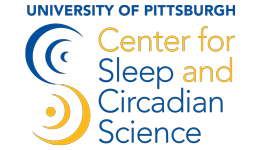Translational Research Training in Sleep Medicine (T32)
Background
Evidence from epidemiologic, basic, and clinical studies suggests that good sleep promotes good health, and that sleep disturbances have adverse health consequences. Sleep disorders are associated with increased mortality risk, as well as increased risk for stroke, obesity, hypertension, and cardiovascular disease. Characteristics of sleep itself are also associated with health. The greatest amount of evidence relates to health correlates and consequences of inadequate sleep duration; but other dimensions of sleep related to health and functioning include sleep efficiency, sleep timing, sleep regularity, alertness, and sleep quality. This has led the sleep and circadian research field to focus on the broader construct of “sleep health.”
The sleep medicine training program focuses broadly on two issues:
-
- Identifying sleep-health mechanisms; and
- Developing evidence-based treatments from these
mechanisms.
Trainees with other interests in sleep and circadian rhythms are also encouraged to apply.
The objective of this NIH-funded T-32 program from the National Heart, Lung, and Blood Institute (NHLBI) is to train clinical and basic researchers in a translational approach to Sleep Medicine.
Our philosophy is that effective research training in sleep medicine incorporates:
– Translational content,
– Multidisciplinary faculty, and
– Competency based outcomes
Emphasis is placed on the acquisition of sleep research skills, development of research questions and protocols, publication of peer-reviewed papers, and submission of a career development grant application to the National Institutes of Health.
The Training Program’s primary focus is on post-doctoral training, with a secondary focus on mentored medical student research.
Please CLICK HERE if you are interested in the T32 program and would like someone to contact you to discuss training opportunities.
T32 Program Directors
Daniel J. Buysse, MD
Training Program Director
Martica Hall, PhD
Co-Director
Chris O’Donnell, PhD
Co-Director
Patrick J. Strollo, MD
Co-Director
The University of Pittsburgh is a leader in multidisciplinary sleep medicine research. Pitt currently ranks #2 in NIH funding for sleep and circadian research Our program is one of only 8 sleep-focused T32s nationally. The research programs of the faculty span the breadth of basic, pre-clinical, clinical, and epidemiological research. We have expertise, and, more importantly, faculty members who collaborate and share trainees.
The faculty mentors comprise an outstanding group of basic, translational, clinical, and intervention investigators with distinguished records in research funding, publication, and training. Their backgrounds and expertise represent the broad diversity of sleep medicine research and training, and their collaborations indicate the deeply multidisciplinary nature of this research.
The sleep medicine training program draws on the experience and resources of these other training programs, but offers a distinct, specialized training experience.
The training program includes two components: 1) Postdoctoral training fellowship for MD scientists from Pulmonary Medicine, Psychiatry, Neurology, and Internal Medicine programs, as well as PhD scientists from neuroscience, physiology, and other sleep-related disciplines; and 2) Medical Student training.
Postdoctoral Program
Our program provides salary support for 2-3 years of post-doctoral research and training, as well as modest funds to support research and educational opportunities. During the training period, fellows will have access to a large multidisciplinary faculty representing the breadth of contemporary sleep medicine research. The core of the program is mentored research using a team mentoring approach. Trainees become active, full-time members of the primary mentor’s research team; are actively involved in protocol design, data collection and analyses and publication of manuscripts. Didactic work includes seminars in sleep research methods, critical appraisal of current literature, professional development and responsible conduct of research. These activities are supplemented by individually-selected courses in the Schools of Health Sciences at the University of Pittsburgh and sponsoring departments.
Training milestones (see figure right) describe the necessary tasks and competencies for successful completion of the training program. The training program is designed to facilitate an orderly progression of Milestones 1-5 resulting in young investigators poised to become independent sleep medicine researchers and active collaborators on larger research projects.
The goal of this training program is to develop the next generation of sleep medicine researchers using a multidisciplinary, translational approach. Emphasis is placed on the acquisition of sleep research skills, development of research questions and protocols, publication of peer-reviewed papers, and submission of a career development grant application to the National Institutes of Health. By the conclusion of the fellowship, trainees will have the skills necessary to begin their faculty career in academic sleep medicine.
Interest applicants should complete the online form or contact Linda Willrich, the program administrator at willrichl@upmc.edu

Medical student summer program: This is a 10 to 12 week individualized research experience with a sponsoring mentor that includes didactics directly linked to student research projects, and opportunities to interact with potential role models and peers.
Medical student scholarly project: This is a longer term involvement through the School of Medicine Scholarly Project.
Interest applicants should complete the online form or contact Linda Willrich, the program administrator at willrichl@upmc.edu






